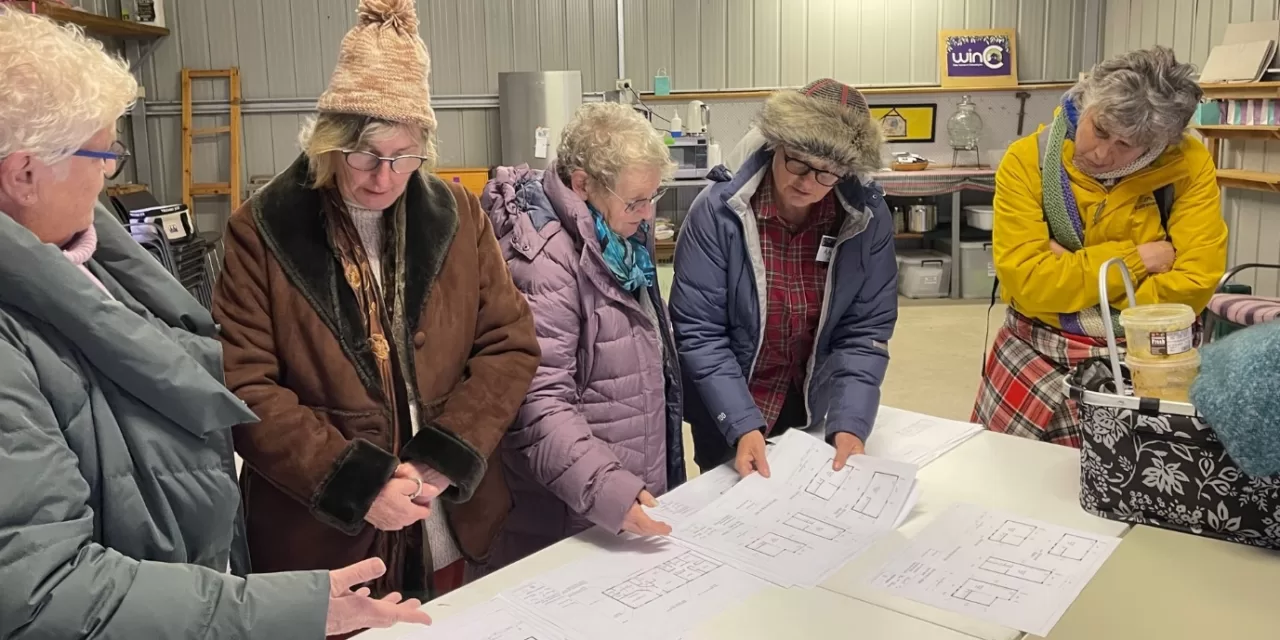Isabella Shaw
After years of searching for a suitable site within the town, Daylesford-based WINC — Older Women in Cohousing Inc — has bought land in Castlemaine to build its unique mixed-tenure cohousing community for older women.
WINC, established in 2017, is a cohousing community being created for and by older women who want to live and grow old together in a positive and vibrant physical and social environment.
Since settling on the 5-acre property in March 2023, around 40 WINC members aged between 50 and 78 have been working with a range of development professionals to create the sustainable, low impact village-like setting of around 32 small homes.
WINC residents will enjoy the use of a well-equipped Common house, workshop and shared gardens designed for both privacy and social engagement, space for independence and help for the times when help is needed.
Along with the privately owned homes, WINC will also offer women who meet the social housing criteria the opportunity to rent a home on site. Other women who have some assets but not enough for a full purchase will be assisted to buy in through a shared equity arrangement with private investors and/or government shared equity programs.
WINC President Mary-Faeth Chenery said the project was unique and could serve as a model for future senior developments across the country to help address the nation’s housing crisis.
The WINC model was attracting interest from a range of sectors, she said.
“We have been working with government, philanthropy, social impact organisations and private financial advisors to establish a source of funding for older women to be able to invest in secure homes for their future,” Mary-Faeth said. “Ideally, we’d like to see the creation of a new model for shared equity social investment that can be used in multiple settings.”
“We recently met with Bendigo State MP Maree Edwards and we had a very positive and encouraging discussion around what options may be out there to support the project,” she said. “We are also engaged in research projects through RMIT and the University of Melbourne, as well as Cohousing Australia, to study and document the process and outcomes of its work.”
“We aim to share all the learnings and documents from the development to enable other cohousing communities to benefit from its process. It’s all very exciting.”
While cohousing is well known in northern Europe and parts of the US, it is just now gathering momentum in Australia.
Research shows that older women in Victoria would choose cohousing over socially isolating individual living and residential aged care as they see it as a successful and positive way to foster health and wellbeing during later life.
The problem of sufficient and suitable homes for older women is exacerbated by Australia’s extreme lack of appropriate and affordable housing, particularly for those on low incomes, which means an increasing number of older women are left with nowhere to go.
“We know older women are the fastest growing group of people experiencing homelessness in Australia,” Mary-Faeth said. “The intersection of ageism, sexism, and homophobia make older lesbians particularly vulnerable. Cohousing projects such as WINC can address this, one small community at a time.”
Meanwhile, work on building their dream continues. WINC members are nearing the end of a participatory design process where they have worked together with an architect to finalise the layout of their homes and where they will be situated on the site.
WINC’s key principles are sustainability, accessibility and design for social interaction. All homes are being designed using passive house principles and aim for at least 8 stars to achieve low cost and environmentally sound living. Well-known local permaculture expert David Holmgren recently visited WINC’s land in Castlemaine to offer best practice advice on water and land management on the site.
Design and planning approvals are expected to take up to 6-9 months and construction between 12-18 months to complete.
“We want to build our community, move in, demonstrate the model, and share the methods with the many groups around the country who also want to contribute to an affordable, community-based housing solution for older women,” Mary-Faeth said.
Isabella Shaw is a writer and member of the WINC cohousing community.
Related stories:
Local Cohousing Group Searching for Development Site





